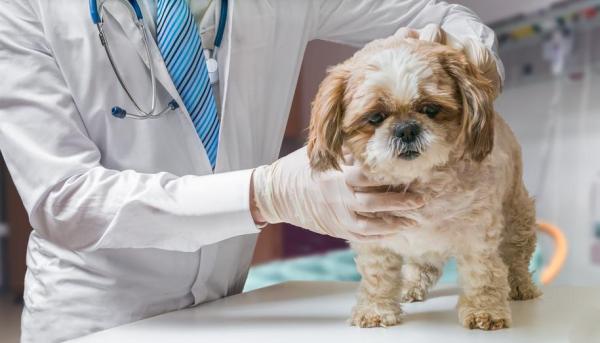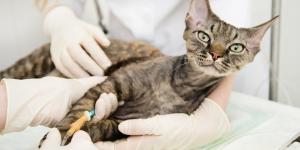How Long Does a Dog Live with Parvovirus?



See files for Dogs
There is no simple answer to the question how long does a dog live with parvovirus? The reason is due to the many mitigating factors. Parvovirus is one of the most feared illnesses of dog guardians, especially those with puppies. It is the young which are usually most at risk. If untreated, this disease is most likely fatal. This is why it is understandable you will want to know how much time you have if you start to see the first symptoms of parvovirus in dogs.
In this AnimalWised article, we not only talk about life expectancy of dogs infected with parvovirus, but we reveal what to look for and what to do if you see symptoms. We will also discuss the treatment of this potentially deadly disease and provide some important background information. The most important thing to know is that immediate action is required if symptoms of this infection are detected.
What is parvovirus in dogs?
Parvovirus in dogs is a viral disease which is most commonly transmitted orally-fecally. This means when a dog eats or is otherwise interacts with another dog's feces infected by parvovirus, they may also contract the infection. An infected dog can release the virus in their stools for several weeks.
If a dog infected with the virus defecates in very cold weather, parvo can also live dormant in frozen stools. Additionally, it can be transported on their legs (especially if there is fecal matter on the fur), as well as other parts of the body and even objects touched by an infected dog. When it is contracted, the disease is acute and very contagious.
The virus attacks cells which are reproducing, such as those lining the gastrointestinal tract. It is this destruction of cells which causes the risk of death. Although parvovirus can affect any dog, puppies between the ages of 6 and 21 weeks are particularly susceptible. The main symptoms of parvovirus are the following:
- Anorexia: weight loss occurs due to the dog stopping from eating.
- Lethargy: the destruction of cells depletes energy leading the dog to become depressed, inactive and exhibit drastic changes in their habitual behavior.
- Fever: parvovirus is usually accompanied by fever.
- Vomiting: not only the will the dog vomit, but this vomit will have a distinct appearance and smell. Vomit from a parvovirus infected dog will also likely contain blood.
- Diarrhea: as the virus can affect the digestive tract, diarrhea is profuse, hemorrhagic and/or mucosal. It is accompanied by a loss of fluid which leads to dehydration. Additionally, the presence of blood in the dog's stool will indicate a poor prognosis.
- Abdominal pain: usually caused by the shrinking of the stomach.
If we recognize these symptoms in our dog, we must immediately take them to the vet. Their lives will depend on it, especially if they are a puppy. Rapid action will greatly influence the life expectancy of a dog with parvovirus.
If the vet suspects parvovirus, fortunately, there is a rapid test which can determine the presence of this disease in minutes. However, this test can obtain false negatives, so the presence of concurrent symptoms is also important. Also, a blood test will likely be taken to see the extent of the infection. This is partly to rule out the myocardial form of the infection which can result in sudden death.
Since young dogs are most at risk, it is understandable we would want to know how long does parvo last in a puppy. In the next sections, we take a closer look at the life expectancy of dogs with parvovirus.
Is parvovirus fatal in dogs and puppies?
As the virus is systemic, it can shut down their necessary bodily functions and lead to death. Fortunately, dogs with parvovirus can recover with the right treatment administered in a timely manner. Puppies may be more vulnerable than adult dogs, but they can also recover in many cases.
Parvovirus treatment requires an aggressive management the symptoms to help fight the infection. How long a dog lives with parvovirus depends on the severity of these symptoms and how long they have contracted the infection. The treatment is intensive, requires hospitalization and usually consists of some combination of the following:
- Fluid therapy: to replenish fluid and electrolytes which are lost by frequent diarrhea and vomiting by the dog. Since the animal will have trouble eating and drinking, this is a vital way to replace lost nutrients. Once the fluid levels are returned, they will be replenished every time the dog loses more fluid through vomiting, defecating, etc.
- Broad spectrum antibiotics: capable of eliminating a wide range of bacteria, they combat opportunistic bacterial infections taking advantage of the dog's lowered immune system. This antibiotic measure helps to reduce the likelihood of complications during treatment.
- Antiemetics: to control vomiting.
- Blood transfusion: may be required since the virus can produce serious anemia. Hemolytic anemia in dogs can be a result of parvovirus infection.
- Parenteral nutrition: as the dog will not be able to feed itself at least until the vomiting subsides, so the dog is fed intravenously.
Antibiotics and fluids are also usually administered intravenously which is one reason for their hospitalization. The vomiting usually prevents oral administration of medications. Round-the-clock care and observation is another reason for hospitalization. If the animal responds positively to treatment and symptoms begin to reside, they can fight the disease. Although this is a serious pathology which can compromise the life of your dog, if treated in time, it is indeed possible to save their life.

How long does parvo last in dogs and puppies?
When a dog is infected by the parvovirus, the incubation period can last up to two weeks, although it can take only a few days. This incubation period is the time it takes for the virus to begin causing symptoms. In newborn puppies, the symptoms usually appear more quickly, although it will depend on other factors such as the size of the viral load to which they are exposed.
These factors such as viral load, age of the dog, state of their immune system and level of care will determine their recovery time. Generally speaking, if a dog is able to survive four days after the onset of symptoms, they are most likely to recover. After this time, the symptoms should begin to subside. Recovery usually takes around one week in puppies, but it can vary in adult dogs.
Learn some more general ways to support a young dog's health with our guide to caring for puppies.
Preventing parvovirus in dogs
Preventative measures are vitally important with parvovirus as it is so contagious. Despite being a relatively recent disease, it has quickly become prevalent. These measures are also important when it comes to asking how long does a dog live with parvovirus. Whether or not they have been taken can affect the prognosis if they are unfortunate enough to still contract the infection. These parvovirus preventative measures include:
- Vaccination: respecting the vaccination schedule whether your dog is a puppy or adult is very important, but especially so when they are younger. No vaccine offers 100% protection, but it is also true that a vaccinated animal will be less contagious than a non-vaccinated one. This in turn positively affects life expectancy.
- Disinfection: cleaning your dog's toys and accessories after playing in high risk areas is important.
- Isolation: keeping puppies which have not finished their immunization schedule separated is very important. It prevents them from coming in contact with dogs whose immunization is unknown as well as keeping them away from excrement.
The dog's state of health prior to the infection is also important as it will keep their strength in reserve when they need it the most. Apart from quality of life, this is another important reason to maintain the overall health of your dog. If the animal has been properly vaccinated, dewormed and well fed, their life expectancy after contracting parvovirus is increased.

Life expectancy of a dog with parvovirus
As we stated above, the life expectancy of a dog with parvovirus depends on mitigating factors. As a summary, these include:
- Speed at which veterinary treatment is commenced, the reason for acting quickly when we spot parvovirus symptoms.
- Adequacy of thew chosen treatment is also important. While most vets will do all they can to help your dog, some may be better trained than others. Also, if there are insufficient resources in terms of antibiotics, antiemetics, etc. this can have a bearing on recovery.
- Presence of blood in stool and vomit means the infection is advanced and can reduce life expectancy prognosis.
- The virulence of the parvovirus strain which infects your dog. Some may be stronger and more resistant to treatment.
- The age of the dog at the time of infection is also important. If they are particularly young or old, they may not have the strength to overcome the disease.
- The status of the dog's immune system is a mitigating factor as a dog which is already ill from another condition may not be able to fight both infections at once.
- A few weeks old puppy will also benefit from a mother with a healthy immune system. Maternal antibodies passed down in the womb and through milk will also help improve prognosis.
Due to these factors, it is impossible to give an exact answer to how long it takes for a dog to die from parvovirus or whether it will survive at all. If the puppy does survive parvo, they can make a full recovery. Early intervention and providing comprehensive treatment is the best way to help chances of survival. Once the dog does recover, there is no reason they can't lead a long, healthy and happy life.

This article is purely informative. AnimalWised does not have the authority to prescribe any veterinary treatment or create a diagnosis. We invite you to take your pet to the veterinarian if they are suffering from any condition or pain.
If you want to read similar articles to How Long Does a Dog Live with Parvovirus?, we recommend you visit our Viral diseases category.








